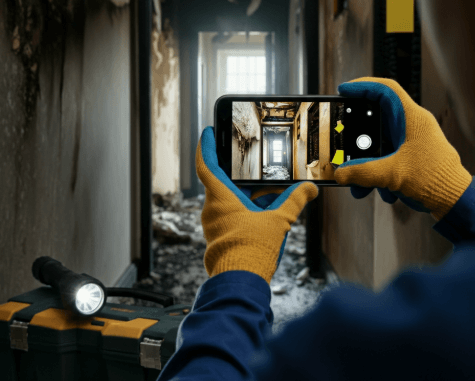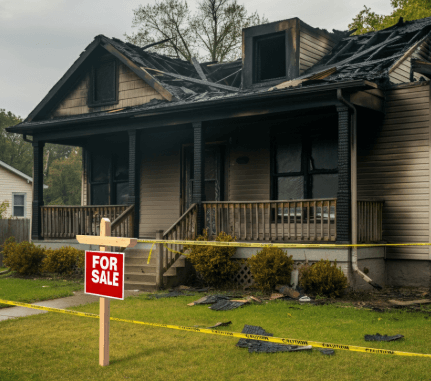Facing the aftermath of a house fire is incredibly difficult, and the path forward can seem uncertain. In Florida, the average cost to repair significant fire damage can range from $25,000 to well over $75,000, not including the complexities of insurance claims and lengthy permit approvals. For homeowners in Southwest Florida, factors like high humidity, contractor shortages, and strict building codes can extend timelines even further, making it a challenging decision to sell. If you need to sell your house after a fire in Cape Coral, Florida, understanding your options regarding costs, timelines, and pricing is the first step toward recovery. This guide provides clear strategies to help you navigate this process. However, there is a faster, simpler solution available. As renowned real estate investors and cash home buyers, Steve Daria and Joleigh purchase homes as-is without needing repairs, showings, or fees. We’ll give you a fair cash offer and close fast, letting you move on without the hassle. If you want to understand how to sell your house after a fire in Cape Coral, Florida, on your terms, we are here to help. Book a free, no-obligation discussion with our team today to explore your options.
What are the first steps I should take after a house fire in Cape Coral, Florida?
After a house fire, prioritize safety before contacting your insurance to begin the claims process.
You should also secure the property immediately by boarding up windows and tarping the roof to prevent further damage from water or trespassing.
Document everything with photos and videos of the damage from all angles, as this will be key evidence for your insurance claim.
Next, obtain a copy of the official fire report from the Cape Coral Fire Department and arrange for a professional damage assessment from a licensed public adjuster or restoration company.

It is also wise to understand the potential costs and timelines by getting repair estimates from reputable local contractors familiar with Southwest Florida’s building codes.
These initial steps are vital whether you plan to rebuild or decide to sell your house after a fire in Cape Coral, Florida.
The process can feel overwhelming, so gathering clear information is the best way to evaluate your options.
Consider booking a free, no-obligation discussion with us for personalized guidance on navigating this complex situation.
Get An Offer Today, Sell In A Matter Of Days…
What kind of damage is common in a house fire besides the visible burn areas?
Beyond the visible flames, a house fire leaves behind extensive hidden damage that is often more complex to address.
Pervasive smoke and soot can infiltrate your entire home, settling deep into insulation, drywall, and your HVAC system, causing persistent odors and air quality issues.
Water from firefighting efforts creates another major problem, soaking into floors and walls, which can lead to dangerous mold growth within 24-48 hours in Florida’s humid climate.
Your home’s essential systems are also at risk, as heat can melt electrical wiring, damage breaker panels, and even compromise plumbing pipes you cannot see.
Furthermore, intense temperatures can warp structural framing and trusses in the attic, weakening the integrity of your roof.
Understanding the full extent of these issues is critical before you decide whether to repair or sell your house after a fire in Cape Coral, Florida.
We recommend a comprehensive inspection that includes air quality testing and moisture mapping to uncover all the damage.
Book a free discussion with a professional today for a clear assessment and to discuss your options with no pressure.
How much does it typically cost to repair a fire-damaged house in Cape Coral, Florida?
- Smoke and Soot Cleanup: This initial step involves specialized cleaning of all surfaces, costing between $3,000 and $15,000. The price depends on the size of your home and how deeply soot has penetrated materials like drywall and insulation.
- Water Damage and Mold Remediation: Firefighting efforts often lead to significant water damage, creating a high risk for mold in Florida’s humid climate. Professional drying and mold removal services typically range from $2,500 to $7,000, with costs potentially exceeding this for more extensive damage.
- Structural and System Repairs: The most expensive part is typically repairing the roof, electrical wiring, plumbing, and structural framing, which ranges from $15,000 to $75,000+. These costs are heavily influenced by the price of materials and the availability of licensed contractors in Southwest Florida.
- Interior Finishes and Restoration: Replacing drywall, flooring, cabinets, paint, and fixtures can add another $10,000 to $50,000 to your budget. The final cost depends entirely on the quality of the restoration materials.
- Permits, Inspections, and Contingencies: Remember to budget for city permits, multiple inspections, and a 10-20% contingency fund for unexpected issues. These administrative and surprise costs can easily add several thousand dollars to the total project.

Should I use my insurance payout to repair the house or just sell it as-is?
Deciding whether to use your insurance payout for repairs or to sell as-is is a significant financial choice that depends on several key factors.
First, you must compare your insurance settlement amount to the estimated cost of repairs, as payouts often fall short of covering everything, especially with Florida’s strict building code upgrades.
Embarking on a complete restoration project requires managing contractors, navigating permit delays with the City of Cape Coral, and covering ongoing mortgage, tax, and utility payments for months.
This path can be incredibly stressful and time-consuming, though it may result in a higher final sale price.
On the other hand, choosing to sell your house after a fire in Cape Coral, Florida, as-is provides a much faster and more predictable outcome.
This option lets you receive the insurance funds and sell the property quickly to a cash buyer, avoiding the hassles and financial risks of a lengthy renovation.
While the as-is sale price will be lower, you save on repair, carrying, and contractor fees.
The best decision comes down to carefully reviewing your repair estimates against your insurance payout and speaking with trusted local real estate professionals to weigh your net proceeds from both scenarios.
What are the benefits of selling my fire-damaged house to a cash buyer in Cape Coral, Florida?
- No Repairs or Cleanout Necessary: You can sell your house exactly as it is, without spending a dime on repairs or even cleaning out debris. Cash buyers purchase your property as-is, which means you avoid the cost and stress of making repairs.
- A Fast and Guaranteed Closing: Cash sales close quickly, typically in 7 to 14 days. Since there are no lenders involved, you avoid the risk of a buyer’s financing falling through at the last minute.
- Avoid Showings and Realtor Fees: Selling directly to a cash buyer means you won’t have to deal with constant showings or open houses. You also save thousands by avoiding traditional agent commissions and closing costs.
- Certainty and a Simple Process: The process is transparent and simple, with a firm cash offer and a clear closing timeline from the start. This eliminates the uncertainty of listing a damaged property on the open market and waiting for an offer.
- Flexible and Convenient Timeline: Cash buyers can work around your schedule, offering a flexible closing date that suits your needs. This allows you to move on when you are ready, without being rushed.
What happens at closing when selling a fire-damaged house?
The closing process for selling a fire-damaged house is typically handled by a professional title company in Cape Coral to ensure a smooth transaction.
First, the title company will search to confirm you have a clear title and will help resolve any outstanding liens on the property.
You’ll receive a settlement statement (HUD-1) detailing all the financial aspects of the sale.
At the closing appointment, you will sign the deed to transfer ownership and other necessary legal documents.
Because it is a cash sale, the process is much faster as there is no lender involvement or financing contingency holding things up.
Once the buyer wires the funds to the title company, they will disburse your payment to you via a wire transfer or cashier’s check.
If you need to sell your house after a fire in Cape Coral, Florida, this final step provides immediate financial relief.
Expert real estate investors Steve Daria and Joleigh offer seamless processes and quick closings, handling all details for clients. Contact them for assistance.
Takeaway
- Understand the Extent of Damage and Get an Inspection: Before listing your fire-damaged home, hire a professional to assess the structural and cosmetic damage. This report helps determine whether to sell “as-is” or invest in repairs for a better return.
- Know Your Costs and Insurance Coverage: Contact your insurance company to understand what’s covered for repairs or cleanup. Factor in out-of-pocket costs like demolition, restoration, and any necessary permits when estimating your selling budget.
- Set a Realistic Timeline Based on Condition: Selling a fire-damaged property can take longer, especially if you’re repairing it first. However, selling “as-is” may speed things up if marketed to investors or flippers.
- Price Competitively Based on Market and Damage: Compare similar properties in Cape Coral, but adjust for fire damage and repair needs. A slightly lower price can attract serious buyers faster in a competitive market.
- Target the Right Buyers and Use Clear Marketing: Highlight potential, not just damage—especially to investors or buyers seeking fixer-uppers. Disclose fire history upfront to avoid legal issues and build buyer trust.
**NOTICE: Please note that the content presented in this post is intended solely for informational and educational purposes. It should not be construed as legal or financial advice or relied upon as a replacement for consultation with a qualified attorney or CPA. For specific guidance on legal or financial matters, readers are encouraged to seek professional assistance from an attorney, CPA, or other appropriate professional regarding the subject matter.

